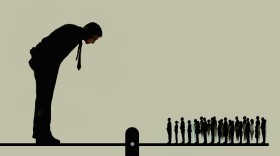
Shankar Vedantam
Shankar Vedantam is the host and creator of Hidden Brain. The Hidden Brain podcast receives more than three million downloads per week. The Hidden Brain radio show is distributed by NPR and featured on nearly 400 public radio stations around the United States.
Vedantam was NPR's social science correspondent between 2011 and 2020, and spent 10 years as a reporter at The Washington Post. From 2007 to 2009, he was also a columnist, and wrote the Department of Human Behavior column for the Post.
Vedantam and Hidden Brain have been recognized with the Edward R Murrow Award, and honors from the American Association for the Advancement of Science, the Society for Personality and Social Psychology, the International Society of Political Psychology, the Society of Professional Journalists, the National Association of Black Journalists, the Austen Riggs Center, the American Psychoanalytic Association, the Webby Awards, the Pennsylvania Associated Press Managing Editors, the South Asian Journalists Association, the Asian American Journalists Association, the Pennsylvania Newspaper Association, the American Public Health Association, the Templeton-Cambridge Fellowship on Science and Religion, and the Rosalynn Carter Mental Health Journalism Fellowship.
In 2009-2010, Vedantam served as a fellow at the Nieman Foundation for Journalism at Harvard University.
Vedantam is the author of the non-fiction book, The Hidden Brain: How our Unconscious Minds Elect Presidents, Control Markets, Wage Wars and Save Our Lives. The book, published in 2010, described how unconscious biases influence people. He is also co-author, with Bill Mesler, of the 2021 book Useful Delusions: The Power and Paradox of the Self-Deceiving Brain.
-
This week on the Hidden Brain radio show, we dig into the culture and psychology that determines the foods that make us salivate and the scents that make us squirm.
-
Many schools give attendance awards to motivate students. A study found students who were awarded for perfect attendance went on to have more absences than their peers who weren't given the award.
-
Schadenfreude is an emotion most people try to hide. But research shows people are more likely to exhibit this feeling if they are die-hard fans of a particular sports team.
-
Decades ago, a group of women accused a prominent playwright of sexual misconduct. For the most part, the complaints went nowhere. In 2017, more women came forward. This time, people listened.
-
A recent study finds companies whose CEOs committed a personal indiscretion — such as infidelity, substance abuse and dishonesty — experienced a decline in shareholder value.
-
This week on Hidden Brain's radio show, we tackle a big topic: power. From our conflicted feelings toward the powerful, to the ways we gain and lose power ourselves, and how power can corrupt.
-
Researchers find that during extra innings, baseball umpires make calls in a way that tends to end games sooner. This seems to be because umpires aren't given additional money to work extra innings.
-
The clicker became a popular tool for dog training in the 1980s. It has also caught on with humans — helping people to become better dancers, fishermen, golfers, and now, surgeons.
-
How many ads have you encountered today? On this week's radio replay, we discuss the insidiousness of advertising in American media.
-
It doesn't just keep them entertained. New research highlights an unexpected positive impact — and also shows that when a parent sings to a child, the parent can benefit, too.








